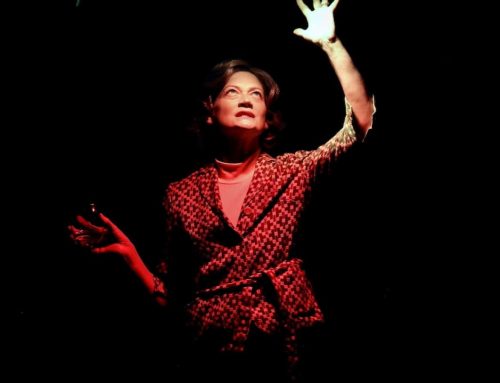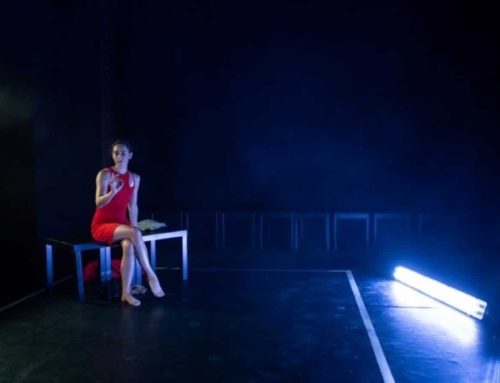The notorious trial of Admiral John Byng in 1757 promises rich source material for a bioplay. It blends personal tragedy, political scapegoating, and the impact of mob mentality against the backdrop of a nation on the cusp of war. Unfortunately, clunky dialogue, lacklustre pacing, and the absence of much in the way of dramatic tension leave Christopher Swann’s take on events, which focuses on the last two days of the protagonist’s life, oddly underwhelming. Swing! Swing! Admiral Byng! ought to be more satisfying than it is.
Admiral Byng (Peter Tate), “52 years old and as decrepit as Methuselah”, is dispatched to the Mediterranean to relieve the besieged British garrison on Minorca, which is threatened by a French invasion. Upon arriving with his underprepared fleet, he engages the enemy in a half-hearted naval battle. “We are no match for the French, but the politicians back home don’t realise”, he tells us in some helpful exposition (of which we get an awful lot).
Fearing defeat, Byng chooses to withdraw, which provokes public outrage in Britain. During scene transitions, a lurking pair of marines (Randy Smartnick and James Shenoi, who gets the best of the evening) deliver scathingly critical ballads about the admiral, the 18th-century equivalent of a Twitter dogpile. The set-up promises resonance beyond its historical setting. Byng was ghosted and cancelled, much like in today’s social media witch hunts, but Swann makes little of it.
The British government, seeking a scapegoat, court-martials “Captain indecisive” Byng. Astonishingly, he is sentenced to death. Accompanied by faithful servant and occasional narrator Hutchens (Chris Barritt in standard humble Jack Tar mode), sibling Sarah (Corrina McDermott emotes sisterly anguish), and best friend Augustus Hervey (Merric Boyd channelling Michael Portillo on one of his TV train journeys), Byng awaits his appointment with the firing squad.
Will a last-minute appeal to the King bring mercy? Rather like a naval Anne Boleyn on the scaffold, the admiral spies the horizon for a message bringing grace. At least he can sip on claret and drill through a few anecdotes of his naval career while he waits. “Why, now in these last moments, would you want me as a friend?” servant Hutchens enquires of the newly solicitous Admiral. It is a question that remains unanswered, like much else here.
Visits from philosopher Voltaire (Merric Boyd again) and the ghost of a future naval officer (James Shenoi again) during a dream complicate matters. “Why are you here?” Byng asks Voltaire. Why, indeed. His presence remains unexplained, though one supposes it has something to do with the protagonist’s ultimate redemption.
“I should have raged against my fate”, Byng declaims at one point. Rage, or much else by emotional affect, feels absent from Tate’s portrayal of the protagonist, even if the gesture-heavy acting style screams classical tragedy. Byng’s mental life vacillates between meek, stiff-upper-lip acceptance of his fate, “You and I alone cannot change the society we’re born in… I will shame them by my dignity in death”, and mild ennui at how unjust the whole business is, “Life is unfair and always will be”.
Perhaps Byng’s calm acceptance of fate is historically accurate, but drama needs some tension to drive the action, and it is hard to identify much inner conflict here. Stripped of his rank, humiliated, hours from death, we are told that Byng’s greatest mistake was to “neglect his inner self”. Quite how this neglect connects with his current predicament is unclear. Matters are not helped by Swann’s tepid direction, which unfolds with the urgency of a Sunday morning stroll through Portsmouth harbour.
Then there is the dialogue. “She’s a cruel mistress, the sea, but one I have come to love” feels derivative, but at least it makes sense. “We are the stars’ tennis balls,” leaves one scratching one’s head. Peter Bingemann’s set, a rank of canvas sails, adds a feeling of the sea to events.
Writer and Director: Christopher Swann
New – Online Shop!
My collected theatre reviews now available in paperback format for the years 2022 and 2023.
Just £10 per copy.
Over 100 reviews in each book.
- John Cutler’s Collected Theatre Reviews – Volume One. 2022. Paperback. 296 pages. ISBN 9781805179757. £10
-
John Cutler’s Collected Theatre Reviews – Volume Two. 2023. Paperback. 284 pages. ISBN 9781836884170. £10
Visit my Online Shop or click on Buy Now to order your copies.
More Recent Reviews
The Sea Horse. Golden Goose Theatre.
The Sea Horse, Edward J Moore’s grim slice of mid-century realism, debuted to solid reviews off-Broadway in 1974. Since [...]
Garry Starr: Classic Penguins. Arts Theatre.
Emperor penguins’ shortish treks between sea and nesting sites are about as peripatetic as your average Thameslink commuter. Garry [...]
When the Clarion Came to Call. Cockpit Theatre.
When, upon entering an auditorium, you are told, ‘Take as many pictures as you like, but mind the ceramics,’ [...]








